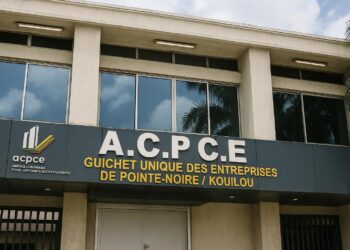ARPCE survey reveals sharp 2025 decline
In its latest compliance survey, the Congolese Posts and Electronic Communications Regulatory Agency reports that only 9.13 percent of mobile SIMs were properly identified and activated in 2025, down from 13.20 percent the previous year (ARPCE, 21 Oct 2025).
The fall violates the obligations set by Decree 554 of 26 July 2010, which makes real-name registration mandatory at point of sale. By tracing subscribers, authorities aim to curb fraud, safeguard digital payments and reinforce national security without constraining legitimate connectivity.
Auditors inspected points of sale between 23 July and 28 August across eighteen towns in Bouenza, Pool, Kouilou, Cuvette and Niari as well as the economic hubs of Brazzaville and Pointe-Noire. Only Kinkala and Djambala achieved full compliance during the spot checks.
Urban hotspots under intensified review
Brazzaville and Pointe-Noire, which concentrate more than sixty percent of national traffic, are singled out for high volumes of unregistered, sometimes pre-activated SIMs. Investigators linked poor documentation to street vendors responding to intense demand for low-cost data packages.
These urban centres are also the most exposed to cybercrime, according to the National Police digital forensics unit, which notes rising cases of mobile money phishing and device cloning. Weak identification creates blind spots that complicate law-enforcement investigations and insurance underwriting.
Regulators emphasise that the issue is one of process, not coverage. Congo-Brazzaville’s mobile penetration already exceeds 100 percent, yet reliable biometric or document capture remains uneven, particularly when power outages interrupt handheld scanners or when agents prioritise sales volumes over compliance.
Some retailers insist that customers resist formal registration for privacy reasons or to circumvent outstanding mobile-money debts, making the education component as critical as enforcement. ARPCE plans radio spots explaining that identification data remain confidential and protected by the 2022 privacy law.
Distribution chain remains the weak link
Airtel Congo chief executive Djibril Tobe concedes that multilayer distribution networks limit oversight. Small independent kiosks often lack secure internet connections to reach the central Know-Your-Customer platform in real time, leading to stockpiling of blank SIMs that later circulate without traceable ownership (Airtel, 21 Oct 2025).
Operators therefore plan to deploy roving compliance officers, random mystery shopping and financial penalties for retailers that activate numbers without matching identity records. Tobe argues that consistent enforcement, rather than new rules, will restore trust among regulators, consumers and investors.
Logistical hurdles also persist in rural zones where poor road conditions and intermittent electricity discourage on-site audits. The regulator is experimenting with solar-powered biometric tablets that can store encrypted data offline and synchronise once the device reconnects to a signal.
Operators pledge quick fixes within 60 days
After reviewing the survey, ARPCE director-general Louis-Marc Sakala gave carriers a two-month deadline to present corrective roadmaps and weekly progress dashboards. The agency warns that fines, licence-renewal delays or public-data blackouts could follow if benchmarks are missed (ARPCE, 21 Oct 2025).
MTN Congo, Airtel and Congo-Telecom have since established joint task forces to harmonise registration APIs, upgrade distributor training modules and share de-duplicated subscriber lists with police. A shared registry could cut identity fraud by flagging multiple accounts linked to one passport or voter card.
Sakala welcomes the initiative and stresses that technology partnerships should align with national data-protection statutes adopted in 2022. He reiterates that enforcement targets compliance, not revenue, and praises operators for embracing a collaborative spirit that strengthens digital sovereignty.
Security and market stakes for investors
Accurate SIM registration underpins risk models for mobile money, which processed an estimated 2.5 trillion CFA in transactions last year, according to the Central Bank of Central African States. Undocumented users raise charge-back costs and impair credit-scoring algorithms used by fintech lenders.
Bond investors also monitor telecom compliance because sector revenues feed into sovereign tax receipts. A drop in trust can translate into higher country-risk premiums. Fitch Ratings already factors regulatory governance into its B stable outlook on Congo-Brazzaville’s debt profile.
Yet the current tightening cycle may unlock opportunities. Vendors of biometric kits, cloud-based KYC analytics and solar-powered routers see a potential market of eleven million active lines. Development-finance institutions have signalled willingness to co-finance last-mile identification capacity as part of digital-inclusion programmes.
Analysts at Ecobank Research argue that disciplined SIM identification could unlock new credit lines from multilateral lenders eager to support digital-public-infrastructure projects. They estimate that every one-point rise in compliance could add 3 million CFA to annual fiscal revenue through VAT and licence fees.
Digital ID technologies on the horizon
The government is exploring integration of SIM databases with the forthcoming national digital identity card, expected to launch pilot issuance in 2026. If achieved, machine-readable IDs would allow instant validation at kiosks, reducing paperwork and shortening average activation time from minutes to seconds.
In the meantime, stakeholders agree that disciplined application of existing rules remains the most immediate lever. As Sakala remarks, “Technological ambition rings hollow without everyday compliance in every market stall.” The coming two months will therefore test the ecosystem’s operational resolve.












































